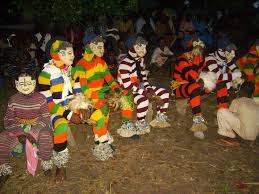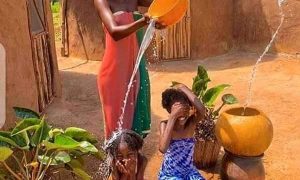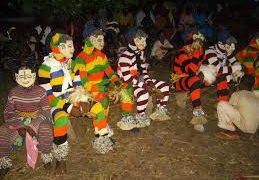idoma news
Demystifying Alekwu, the god of Idoma men by Adoyi Abah Ali

Yesterday, my comment on the Idoma’s Alekwu provoked serious reactions both in support and against our most fearful and renowned deity. Some even went as far as advising me to appease Alekwu for the open criticism or I will die. And I laughed that off.
Contrary to some views, I know my culture and I’m grounded deeply in the knowledge of Idoma culture.
I’m sure many did not realize that my target was not the innocent Alekwu. My target was the creators, the progenitors (Men)
I mean those who dug Alekwu out of the ant-hole (Ogilu). The popular myth is that Alekwu lives in the ant-hole (Ogilu). That’s why during Alekwu Festival, it joins the Idoma people and returns after Orureshi (Akatakpa-Oroja). All the masquerades believed to be the representatives of the Alekwu will then return to the ant-hole. So men dug this trouble out. It’s simply an idea to suit a particular purpose. This to me, is incontestable.
Today, I have two concerns.
1. Why have the men, including me, who created the Alekwu abandoned him in the ant-hole? When last was Alekwu celebrated? The festival and the ritual aspect that used to resonate the superiority of the deity over other smaller gods have gone into extinction. What happened?
Do you know the significance of the New Yam Festival? Do you know the meaning of Orureshi, Alekwu Ono and Alekwu Ogwa? Alekwu was celebrated like Christmas and New Year in those days. I will tell you an interesting story about my ‘’Alekwu journey’’ in one of the chapters of my book on the deity.
In those days, I personally ate, danced and sang with the Alekwu. My elder brother was even an Alekwu apostle. He had an agge, akatakpa and even beat drums for Atu and Eji. These names may sound so strange to you, but you don’t need to crack your head. It’s to show how deeply I was involved. In those days, there used to be extreme communal living. The last appearance of the regenerated ancestors (Akatakpa) in the market would be a huge celebration. Everyone would gather to eat, drink and make merriment. Animosity, hatred and jealousy were quite minimal.
Alekwu at that time was an instrument of truth and love. But do we still have all that today? Many people today are even afraid of going to their villages. The blood of the innocent have flowed down the same ant-hole. People are now doing so many things and going scot-free without being questioned by the Alekwu gods who in those days was a god of ‘’immediate justice.’’
I strongly believe that the Alekwu is now angry with the men for abandoning it. In most communities in Idoma land, you hardly find men. There is a trend of early deaths among men. Women have taken over in many communities. They are mostly widows. It goes to show that Alekwu is angry and has gradually gone off the stage, and now sitting at the apron watching just the women to misbehave, and he strikes. But trust our women, they have got good upbringing. They are naturally afraid of God Almighty and have so much respect for their husbands and hardly misbehave. I’m not sure Alekwu is even the reason most of them have remained faithful in their marriages. It’s simply a matter of who they are.
In those days, Alekwu Owukpa had its headquarters at Ipole Owukpa. Once a man commits murder or any of such heinous act, he would die upon stepping his foot on the soil.
So my second question is, why has everything gradually faded away but the biased tradition against women remains firmly in place?
Most recently, I did an investigation and realized that women still go to the village to do what our elders call ‘Idoko-Ejuja.’ In this ritual, a woman goes to confess an unfaithful act to the family. This will be accompanied by sacrifices. Why has that not gone into extinction too? Do men go for the same open confession? How many can they even confess???
Men have argued that they are the head, hence Alekwu is on their side. To be the head is not to ”cut off the head.” To head a home is not to mislead but to lead fairly and genuinely. This is partly why African leadership question can’t be resolved.
The leaders see the followers as slaves, hence the continuous decadence. The day our leaders will realize that they are the real servants, Africa will change. The same applies here. That you are the head of the house, means that you should lead by example and don’t patronize what the society abhors. Why promoting immorality, and sacrificing your partner for the same offence? Lead by example.
Finally, one of the most dynamic things in life is culture. I have read about the Alarinjo festival and its transformation as the society evolves. I also read about the Egungun festival and how it changed with time, and most recently, the Ogboni society.
Cultures change with time as the society evolves. Look at the culture of killing of twins, the culture of burying slaves with the kings and a host of others.
These cultures have all faded away, and I think our women deserve our support for a total liberation from this slavery.
I look forward to the review of the role of the Alekwu god so that it deals with men the same way it punishes women. But if men feel the punishment is stiff, they can move for abolishment.
I look forward to a more energetic Alekwu with a renewed vigour to deal decisively with evil doers in Idoma land.
I want to see a god with a clear eyesight on matters that concern both men and women. It shouldn’t be blind to a particular sex.
I want a god of justice; a god commonly called Alekwu ogboogbaa (Line by line)
I want to see an Idoma man who sees his wife as an integral part of him and not as a commodity. Consider that poor woman’s feelings while making these laws, this obnoxity.
I insist that there is a need for equity in this tradition deliberately created by men.
Be a husband-man.
I will look at all other injustices that accompany this unsavory tradition in my book. Watch out!
God bless Idoma land.
Adoyi Abah Ali (Writer, Critic.)















